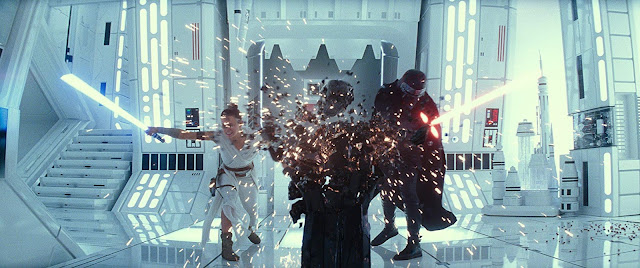"Confronting fear is the destiny of the Jedi."

Blockbuster filmmaker J.J. Abrams returns to a galaxy far, far away to (definitively) end the Star Wars sequel trilogy he restarted in The Force Awakens and cap off what's become known as the nine-episode Skywalker Saga. Consider it unfortunate how much Star Wars: Episode IX – The Rise of Skywalker is full of such wild highs and lows, overdone fan service, and some egregious retconning. It's hard to believe where the film went in ending the new Star Wars trilogy.
To say Skywalker is convoluted is an incredible understatement. The third/ninth entry resurrects Emperor Palpatine undramatically as the overarching villain controlling the events since his apparent original demise in Return of the Jedi. His reappearance is introduced in the opening crawl ("The dead speak!") yet there were no signs of his presence in previous films and this film's original director Colin Trevorrow (who maintains a co-story credit) had no plans to include him. However, the entire film is focused on his return and many twists are seeded in his newly invented post-death legacy.
There's a relentless pace that packs in so much unneeded exposition starting out on a violent montage of Kylo Ren searching for the resurrected Emperor. His existence back from the dead is the whole of the (awkwardly shoehorned) premise of the entire film and it feels like complete nonsense. He's so incredibly powerful yet his crazily huge secret plans since being "killed" went unseen and unexplained.
Franchise stars Daisy Ridley and Adam Driver continue their weirdly symbiotic but very compelling battle as Rey and Kylo Ren through an endless amount of lightsaber duels as they chase each other across the galaxy time after time on a series of unnecessary missions to find different MacGuffins to finally meet at a secret location key to the balance of power in the universe. It's incoherent how many times they face off against each other only to avoid any kind of resolution as they race towards a rehash of different elements of Jedi's ending.

Written by Abrams and Chris Terrio, Skywalker lacks the stakes established in previous entries and makes the consequences far too outlandish or confusing despite the small-scale feel of many of the characters. All of the jam-packed action filled with massive setpieces starts to ring hollow halfway through because there is just so much, too much going on. Unlike its predecessor's themes about killing the past and reinventing Star Wars into something new and better, this film has little substantial to say about our paths, freedom, fandom, or leadership.
It feels like Abrams tried to fit it at least two different films in his exhausting finale albeit ignoring or undoing much of the events of The Last Jedi. He introduces so many new, key characters without much fanfare while sidelining so many other favourite ones—Kelly Marie Tran's Rose is barely acknowledged. John Boyega and Oscar Isaac as Finn and Poe rejoin Rey in their sparkling team dynamic but much of their expositionary interactions and banter are haphazardly rushed.
Sadly, the departed Carrie Fisher (who gets top-billing) is inserted into the story via deleted scenes and unused footage from previous films for little but tearjerking consequence. It feels nice and fitting yet jarring in how Abrams tries to tie everything together with her unfortunate real-life death alongside Mark Hamill's Luke Skywalker as a wise Force ghost presence. The film lacks any real consequences to deaths or endings and anything feels like it can be and is undone at a moment's notice over and over again.
The Rise of Skywalker ends a trilogy of trilogies in overly operatic but ultimately very unsatisfying fashion as a hollow spectacle. Abrams, known for his respect and reverence for adapting and rebooting existing franchises or material, feels incapable of resolving things despite a clear talent for restarting them. It feels apparent thanks to five films in just six years (counting anthology spin-off films) after laying long-dormant, Star Wars as a franchise needs to be reinvented (as teased in The Last Jedi) for new audiences instead of simply reliving (or remaking) the past.
More | YVArcade / AV Club / Indiewire / ScreenCrush / Uproxx / Vox







0 reactions:
Post a Comment